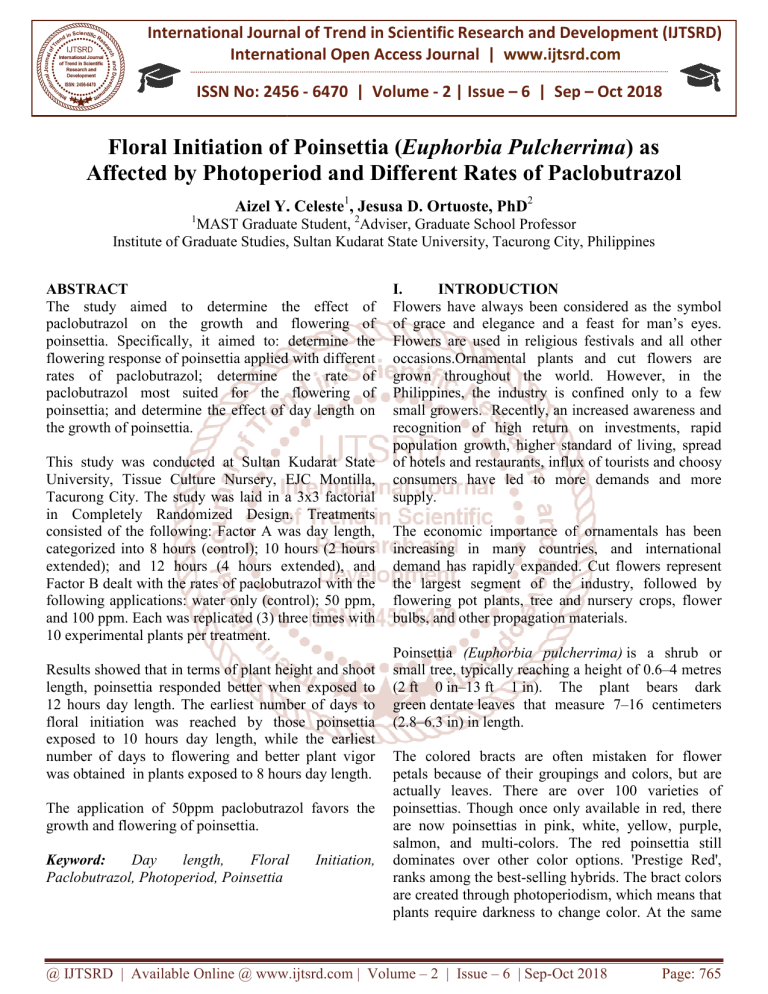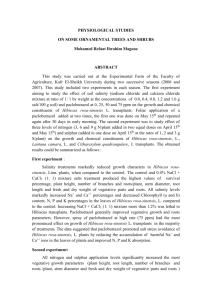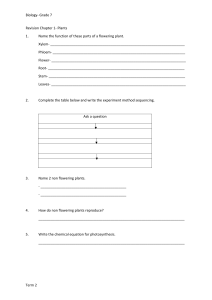
International Journal of Trend in Scientific Research and Development (IJTSRD)
International Open Access Journal | www.ijtsrd.com
ISSN No: 2456 - 6470 | Volume - 2 | Issue – 6 | Sep – Oct 2018
Floral Initiation off Poinsettia ((Euphorbia
Euphorbia Pulcherrima)
Pulcherrima as
Affected byy Photoperiod and Different Rates off Paclobutrazol
Aizel Y.. Celeste1, Jesusa D. Ortuoste, PhD2
1
MAST Graduate Student
Student, 2Adviser, Graduate School Professor
Institute of Graduate Studies,, Sultan Kudarat State University, Tacurong City,
City Philippines
ABSTRACT
The study aimed to determine the effect of
paclobutrazol on the growth and flowering of
poinsettia. Specifically, it aimed to: determine the
flowering response of poinsettia applied with different
rates of paclobutrazol; determine the rate of
paclobutrazol most suited for the flowering of
poinsettia; and determine the effect of day length on
the growth of poinsettia.
This study was conducted at Sultan Kudarat State
University, Tissue Culture Nursery, EJC Montilla,
Tacurong City. The study was laid in a 3x3 factorial
in Completely Randomized Design. Treatments
consisted of the following: Factor A was day length,
categorized into 8 hours (control); 10 hours (2 hours
extended); and 12 hours (4 hours extended), and
Factor B dealt with the rates of paclobutrazol with the
following applications: water only (control); 50 ppm,
and 100 ppm. Each was replicated
ted (3) three times with
10 experimental plants per treatment.
Results showed that in terms of plant height and shoot
length, poinsettia responded better when exposed to
12 hours day length.. The earliest number of days to
floral initiation was reached by those
hose poinsettia
exposed to 10 hours day length,, while the earliest
number of days to flowering and better plant vigor
was obtained in plants exposed to 8 hours day length.
The application of 50ppm
ppm paclobutrazol favors the
growth and flowering of poinsettia.
Keyword:
Day
length,
Floral
Paclobutrazol, Photoperiod, Poinsettia
Initiation,
I.
INTRODUCTION
Flowers have always been considered as the symbol
of grace and elegance and a feast for man’s eyes.
Flowers are used in religious festivals and all other
occasions.Ornamental
Ornamental plants and cut flowers are
grown throughout the world. However, in the
Philippines, the industry is confined only to a few
small growers. Recently, an increased awareness and
recognition of high return on investments, rapid
population growth, higher
igher standard of living, spread
of hotels and restaurants, influx of tourists and choosy
consumers have led to more demands and more
supply.
The economic importance of ornamentals has been
increasing in many countries, and international
demand has rapidly
y expanded. Cut flowers represent
the largest segment of the industry, followed by
flowering pot plants, tree and nursery crops, flower
bulbs, and other propagation materials.
materials
Poinsettia (Euphorbia pulcherrima) is a shrub or
small tree, typically reaching a height of 0.6–4
0.6 metres
(2 ft 0 in–13 ft 1 in). The plant bears dark
green dentate leaves that measure 7–16
7
centimeters
(2.8–6.3 in) in length.
The colored bracts are often mistaken for flower
flowe
petals because of their groupings and colors, but are
actually leaves. There are over 100 varieties of
poinsettias. Though once only available in red, there
are now poinsettias in pink, white, yellow, purple,
salmon, and multi-colors.
colors. The red poinsettia still
dominates over other color options. 'Prestige Red',
ranks among the best-selling
selling hybrids. The bract colors
are created through photoperiodism, which means that
plants require darkness to change color. At the same
@ IJTSRD | Available Online @ www.ijtsrd.com | Volume – 2 | Issue – 6 | Sep-Oct
Oct 2018
Page: 765
International Journal of Trend in Scientific Research and Development (IJTSRD) ISSN: 2456-6470
2456
time they need abundant light during the day for the
brightest color.
Fertilization, therefore, is important to replenish the
lost element needed for plant growth and flowering
response. Paclobutrazol inhibited growth considerably
and contributed to the increase in fruit formation not
only for grapes but also
lso for many other tree species
[1].
There are rates and methods of applying fertilizers to
various crops to promote high yield. Hence, this study
was conducted to promote a basic source of
information for growth and flowering of poinsettia.
Likewise, this study will be useful as guide for
technology
chnology to growers, producers and entrepreneurs
of flowering plants.
Thus, the study was conducted to determine the effect
of paclobutrazol on the growth and flowering of
poinsettia. This study was only limited to the growth
and flowering response of poinsettia
ettia applied with
different rates of paclobutrazol.
This was conducted at Sultan Kudarat State
University (SKSU) Tissue Culture Nursery, EJC
Montilla, Tacurong City, from September
September- December
2014.
METHODOLOGY
The materials used in this study were as follows:
270uniform stem cuttings of poinsettias, 270 pieces of
polyethylene bags, ordinary garden soil, plywood,
paintbrush, ball pen, record book, graduated cy
cylinder,
shovel, wheel barrow, 4pcs. incandescent bulb (50w).
Male/female socket, receptacle, flat cord wire no.
no.16,
safety box/main switch and tools.
The study was laid in a 3x3 factorial in Completely
Randomized Design. Treatments consisted of the
following: Factor A was day length, categorized into
8 hours (control); 10 hours (2 hours extended); aand 12
hours (4 hours extended), and Factor B dealt with the
rates of paclobutrazol with the following applica
applications:
water only (control); 50ppm, and 100ppm.
ppm. Each was
replicated (3) three times with 10 experimental plants
per treatment.
The soil media was composed of garden soil.All the
270 plants were properly arranged in rows based on
the treatment to be applied. Lighting tools and
materials were procured and installed at the research
area, which is the SKSU Nursery. A licensed
electrician was hired to install
nstall the lighting system for
security and safety. Application of paclobutrazol was
done two times a month. The solution was applied by
using a drench in order to ensure that it penetrated the
roots.
The following data were gathered: Plant Height (cm),
Shoot Length(cm)Number of Days to Floral Initiation,
Number of Days to Flowering, Plant Vigor, and
Reaction to Pests and Diseases.
Data gathered were statistically analyzed using the
analysis of variance in Completely Randomized
Design. The Least Significance Difference (LSD)
testwas employed to compare the significant
difference between or among treatment mean values.
RESULTS AND DISCUSSION
Number of Days to Floral Initiation
Statistical analysis revealed that there was no
significant difference among the treatments
tr
tested.
Numerically, the number of days to floral initiation
ranged from 21.16, 20.01, 21.57 days, respectively.
On the other hand,
and, poinsettia applied with 50ppm
50
paclobutrazol (B2) was observed to initiate flower
induction within 17.43 days, followed
foll
by the control
plants (B1) with water only, and 100ppm
100
(B3) of
paclobutrazol with the mean of 20.92 and 24.39,
respectively. Results can be attributed to the effect of
paclobutrazol which was noted to enhance early
flowering of mango and rambutan. Various
Va
plant
growth regulators have proven to be effective in
inducing flowering of pineapple such as ethylene
releasing hormones.
On the other hand, paclobutrazol is very popular
nowadays especially on fruit crops such as rambutan,
[2] durian [3] mango [4], and pineapple [5] it is a
potent plant growth retardant, which is active on a
broad range of plant species. It has potential
agronomic importance in controlling the vegetative
growth of plant.
Furthermore, it was found that there was a significant
interaction
ction effect between paclobutrazol and day
length.
gth. Poinsettia applied with 50ppm
50
paclobutrazol
exposed to 10 hours day length initiated flower
induction earlier (A2 B2), while the latest to initiate
flowering were applied with 100ppm
100
paclobutrazol,
@ IJTSRD | Available Online @ www.ijtsrd.com | Volume – 2 | Issue – 6 | Sep-Oct
Oct 2018
Page: 766
International Journal of Trend in Scientific Research and Development (IJTSRD) ISSN: 2456-6470
2456
regardless of day length exposure with a mean of
23.77 and 25.30 days, respectively.
Results were supported by the findings of [6] that
postharvest
harvest application of a small amount of
paclobutrazol to the soil significantly promoted
flowering and fruiting in plants. Early flowering
enhanced fruit maturity. Treated trees and pineapple
flowered three to four weeks early, which reduced the
time fruiting by at least two weeks. [5] Moreover,[5]
stated that the application of the PBZ weeks before
flower induction of pineapple was highly significant.
significant
Table1. Number of Days to Floral Initiation of Poinsettia as Affected by Day length and Rates of
Paclobutrazol after first application of PBZ, SKSU, 2015
Factor B
Factor A
(Rates of Paclobutrazol)2/
Mean
(Day length)
B1 (Water only) B2 (50ppm) B3 (100ppm)
A1- 8hours
19.72c
18.47c
25.30a
21.16
bc
d
24.10a
20.01
23.77ab
21.57
A2- 10 hours
20.40
15.53
A3- 12 hours
22.63b
18.30c
b
c
a
Mean 1/
20.92
17.43
24.39
20.91
1// Treatment means having common letters superscript are not significantly different at 1% level.
2// Treatment means having common letters superscript are not significantly different at 5 % level.
Number of Days to Flowering
Statistical analysis revealed that there was no significant difference among the treatments tested.
The earliest number of days to flowering was shown by poinsettia exposed to 8 hours day length with a mean of
28.34.
On the other hand, poinsettia applied with 50 ppm paclobutrazol (B2) was observed to be the earliest (27.38) to
flower, followed by plants treated with water only (B1) and plants applied with 100 ppm (B3) of paclobutrazol
with a mean of 28.39 and 29.42, respectively.
spectively. The result of the study wass supported by the findings of [7] that a
direct way of paclobutrazol to stimulate flower initiation is by inhibition of shoot growth. Flower initiation in
apple and pear [8] is correlated with marked shortening of the plastochrone i.e. the average time interval
between the appearance of successive primordial within the bud, prompting the suggestion that floral initiation
might be triggered by the accumulation of a critical number of primordial with bud.
Table 2.Number of Days to Flowering of Poinsettia
Poinsettiaas Affected by Day length and Rates of
Paclobutrazol, SKSU, 2015
Factor B
Factor A
(Rates of Paclobutrazol)
Mean1/
(Day length)
B1 (Water only) B2 ( 50ppm) B3 (100ppm)
A1- 8hours
55.73
64.97
59.68
60.13b
A2- 10 hours
63.33
67.53
65.37
65.41a
A3- 12 hours
62.83
71.87
67.77
67.49a
Mean2/
60.63c
68.12a
64.27b
63.34
1// Treatment means having common letters superscript are not significantly different at 1% level.
Plant Height (cm)
Statistical analysis revealed a highly significant difference among the treatments tested. Poinsettia exposed to
12 hours (A3) day length grew tallest with a mean of 67.49 cm. The shortest height was observed in plants with
8 hours exposure to sunlight.
@ IJTSRD | Available Online @ www.ijtsrd.com | Volume – 2 | Issue – 6 | Sep-Oct
Oct 2018
Page: 767
International Journal of Trend in Scientific Research and Development (IJTSRD) ISSN: 2456-6470
2456
In terms of the effect of paclobutrazol, it was observed that poinsettia applied with 50 ppm
paclobutrazol gained the tallest plant height with a mean of 68.12 cm; control plants (water only) got the
shortest height with a mean of 60.63 cm.
Result can be attributed to the stress-related
related effect of plants. The higher the degree of light the plant receives
the faster the photosynthesis effect. Hence, the plant will develop faster.
However, no interaction effect was found between the day length and rates of paclobutrazol. Plant height
ranged from 55.73 cm to 71.82 cm regardless of the rates of paclobutrazol and day length exposure.
Table3. Plant Height (cm) of Poinsettia as Affected by Day length and Rates of Paclobutrazol, SKSU, 2015
Factor B
Factor A
(Rates of Paclobutrazol)
Mean
(Day length)
B1 (Water only) B2 ( 50ppm) B3 (100ppm)
A1- 8hours
28.50
27.30
29.23
28.34
A2- 10 hours
28.17
27.50
29.50
28.39
A3- 12 hours
28.50
27.33
29.53
28.46
b
c
a
Mean1/
28.39
27.38
29.42
28.73
1// Treatment means having common letters superscript are not significantly different at 1% level.
2// Treatment means having common letters superscript are not significantly different at 1% level
Shoot Length
Statistical analysis revealed that there was a significant difference among the treatments tested. Poinsettia
exposed to 10 hours (A2) and 12 hours (A3) day length exhibited the longest shoot with a mean of 53.08 cm and
55.15 cm, respectively. While the shortest shoot with a mean of 41.13 cm was found in plants with 8 hours
exposure to sunlight. This can be attributed to light intensity levels that have a significant effect on
photosynthesis, which directly relate to tthe plant’s ability to grow fast.
In terms on the effect of paclobutrazol, it was observed that poinsettia applied with 50ppm
50
paclobutrazol got
the longest shoot of 54.68 cm and the shortest from control plants (water only) 42.93 cm. Results were
contrary to the findings of [5] that paclobutrazol enhance rosette formation of pineapple leaves thereby showed
stunted and shorter growth of pineapple plants. This may be due to the time of the conduct of the study which
was a short day period; hence, poinsettia was unaffected by paclobutrazol.
Meanwhile,, no interaction effect was found between day length and paclobutrazol in terms of shoot length.
Table4.
4. Shoot Length (cm) of Poinsettia as Affected by Day length and Rates
es of Paclobutrazol, SKSU, 2015
Factor B
Factor A
(Rates of Paclobutrazol)
Mean1/
(Day length)
B1 (Water only) B2 ( 50ppm) B3 (100ppm)
A1- 8hours
3.33
3.67
3.33
3.44a
A2- 10 hours
3.67
3.33
2.67
3.22a
A3- 12 hours
2.67
2.67
2.33
2.56b
Mean
3.22
3.22
2.78
3.07
1// Treatment means having common letters superscript are not significantly different at 1% level.
2// Treatment means having common letters superscript are not significantly different at 1% level.
@ IJTSRD | Available Online @ www.ijtsrd.com | Volume – 2 | Issue – 6 | Sep-Oct
Oct 2018
Page: 768
International Journal of Trend in Scientific Research and Development (IJTSRD) ISSN: 2456-6470
2456
Plant Vigor
Statistical analysis revealed that there was a significant difference among the treatments tested. Result showed
that 8 hours and 10 hours day length exhibited vigorous poinsettia plants with healthy green leaves gaining a
mean of 3.44 and 3.22, respectively.
ly. Plants with 12 hours extended day length was observed to be moderately
vigorous.In
In terms of levels of paclobutrazol
paclobutrazol, no significant difference was found among the treatments tested.
Numerically, results were 3.22, 2.78, respectively, with more or less vigorous plants.
Likewise, there was no interaction effect between day length and paclobutrazol in terms of the number of days
to flowering.
Table 5.Plant Vigor of Poinsettia as Affected by Day length and Rates of Paclobutrazol, SKSU, 2015
Factor B
Factor A
(Rates of Paclobutrazol)
Mean
(Day length)
B1 (Water only) B2 ( 50ppm) B3 (100ppm)
A1- 8hours
3.33
3.67
3.33
3.44
A2- 10 hours
3.67
3.67
3.67
3.67
A3- 12 hours
3.37
3.67
3.33
3.56
Mean
3.56
3.67
3.44
3.56
1/ Treatment means having common letters superscript are not significantly different at 5% level.
Reaction to Pests and Diseases
Statistical analysis revealed no significant difference among the treatments tested. Results revealed that plants
were slightly damaged of fungal disease
se with mean ranging from 3.33 to 3.67.
In terms of levels of paclobutrazol, there was no significant difference found among the treatments tested.
Numerically, the mean results were 3.56, 3.67, 3.44, respectively, with slightly damaged plants.
Table 6.Reaction
Reaction to Pests and Diseases of Poinsettia as Affected by Day length and Rates of
Paclobutrazol, SKSU, 2015
Factor B
Factor A
(Rates of Paclobutrazol)
Mean1/
(Day length)
B1 (Water only) B2 ( 50ppm) B3 (100ppm)
A1- 8hours
35.63
47.13
40.63
41.13b
A2- 10 hours
48.84
56.00
54.40
53.08a
A3- 12 hours
44.33
60.91
60.20
55.15a
Mean2/
42.93b
54.68a
51.74a
49.79
CONCLUSION
Based on the results, it is concluded that the
application of 50ppm paclobutrazol favors the growth
and flowering of poinsettia. Floral initiation of
poinsettia is initiated earlier by exposure to 10 hours
day length;; while the number of days to flowering and
plant vigor are better enhanced by exposure to 8 hours
day length. Plant height and shoot length are
increased when exposed to 12 hours day length
length.
Thus, the researcher recommends that floral initiation
of poinsettia is enhanced with 8 hours to 10 hours
exposure to visible lights/day
day length regardless of the
rates of paclobutrazol.
It is recommended that a similar study be made using
shorter (less than 8 hours) day length, preferably
during the long day period specifically, April –
August.
@ IJTSRD | Available Online @ www.ijtsrd.com | Volume – 2 | Issue – 6 | Sep-Oct
Oct 2018
Page: 769
International Journal of Trend in Scientific Research and Development (IJTSRD) ISSN: 2456-6470
2456
REFERENCES
1. HEDDEN, P. and J.E GRAEBE. 1985. Inhibition
of gibberellin biosynthesis by paclobutrazol in
cell-free homogenates of Cucurbita maxima
endosperm and Maluspumila embryo. J. Plant
Growth Reg. 4: 111-122.
2. CHINSATHIT, S. 1995. Effect of paclobutrazol
on shoot growth, flowering, fruit set and yield of
rambutan(Nepheliumlappaceum L.)
.) varRongrien.
PhD. Dissertation, UPLB, College Laguna. 138
pp.
3. KARIM,, Z. 1992. Issues and Challenges in
Malaysian Horticulture: Implications for Research
and Education. ActaHortic. 292, 255
255-270. DOI:
10.17660/ActaHortic.1992.292.33,
https://doi.org/10.17660/ActaHortic.1992.292.33
10.17660/ActaHortic.1992.292.33
4. CHARNVICHIT, S and P. TONGUMPAI, 1989.
Effect of paclobutrazol and floral initiation and
development of mango, cv ‘KhiewSawoey’. Proc.
Sec, Symp. Plant growth regulators in crop
Production, 4-66 September, 1989. Bangkok, Thail;
and pp. 132-136.
5. ORTUOSTE, J.D. 2003. Response of Smooth
Cayenne’ Pineapple (Ananascomosus (L.)Merr)
(L.)Merr to
Paclobutrazol
and
Ethrel
Application.
Application
Unpublished Dissertation, UPLB, College,
Laguna, Phils.
6. VAN HUYLENBROAECK.1994.Influence of
paclobutrazol and photoperiod on the growth and
flowering of gardenia jasminoidespp 77-85.
77
7. LUKEWILL,
process of
Proceedings
Horticultural
245.
L.C. 1975. A new look at the
fruit bud formation in apple.
of the
XIXth
International
Congress, Warsaw, 1974, 3, 237-
8. R. M. FULFORD; the Morphogenesis of Apple
Buds: II. The Development of the Bud, Annals of
Botany, Volume 30, Issue 1, 1 January 1966,
Pages
25–38,
25
https://doi.org/10.1093/oxfordjournals.aob.a08405
7
@ IJTSRD | Available Online @ www.ijtsrd.com | Volume – 2 | Issue – 6 | Sep-Oct
Oct 2018
Page: 770



